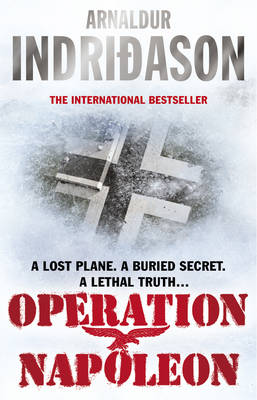
EURO CRIME
Reviews

Indridason, Arnaldur - 'Operation Napoleon' (translated by Victoria Cribb)
Paperback: 336 pages (Oct. 2010) Publisher: Harvill Secker ISBN: 1846552850
Ten years ago, Arnaldur Indridason took a break from his excellent series about dour, depressed Icelandic police inspector Erlendur, and published a thriller which has only now been translated into English. Operation Napoleon is the code name for a top-secret mission in the closing days of World War Two. In an opening chapter, set in 1945, we read of a German plane crashing into a glacier in Iceland, and the attempt of one of the passengers, briefcase chained to wrist, to reach help through the blizzards and snowdrifts. The action shifts to the present day (1999). In the United States, the military have kept a close eye on the site of the plane's crash all those years ago. Their vigilance is rewarded when a satellite image shows the shape of the aircraft revealed under the shifting ice of the glacier. A top-secret team, led by a thuggish type called Ratoff, is immediately dispatched to recover the plane and its contents.
A lawyer for the Icleandic Trade Council, Kristin, receives a phone call from her beloved younger brother Elias. Elias is out on the glacier with an adventure group. He and a friend are trying out some new snowmobiles when they stumble across the plane wreck and the recently arrived US Army personnel. Excitedly, he calls his sister to tell her of his discovery – but they are cut off before Elias can say much. Kristin can't tell what is going on, of course, but in fact Elias and his companion are being savagely treated by Ratoff's men in order that they can find out who Elias was talking to. Ratoff, acting on longstanding orders, is determined that nobody should know about the plane while he and his team are cutting it up to ship it out to an Argentinian island.
Blissfully unaware of these events, Kristin is at home that evening when two men appear at her home. Thinking they are Jehovah's witnesses, she opens the door to dismiss them when they burst in, overpower her and question her about her brother and what was said in his phone call. They write out a suicide note and clearly plan to kill her. Kristin is terrified, but manages to take advantage of an unexpected and strangely welcome unfriendly visitor to make an escape, fleeing through the icy streets in her socks.
OPERATION NAPOLEON continues at a fast pace, as Kristin desperately tries to outwit the superior and ruthless forces attempting to silence her, and help her brother. Officials from the US Embassy, in the meantime, arrogantly try to spin a story to the Icelandic prime minister about what's going on at the glacier, and Ratoff becomes even more vicious as events spiral outside his control.
This novel is certainly a page-turner, and the character of Kristin an attractively capable heroine. However, the problem with end-of-World War Two conspiracy thrillers is that there are not that many possible punchlines – and as a couple of potential candidates for the true nature of "Operation Napoleon" are used fairly early in the novel as cover stories by the Americans, it isn't too hard for the reader to work out what is going on, in outline. It's up to you whether you find either the Operation itself likely, or the ruthlessly efficient post-war behaviour of "those in the know" credible.
Overall, the American military is portrayed in an immensely unsympathetic way, and there is quite a bit of violence in the book associated with them. The Icelandic characters are mostly honest, decent folk. (There is a token good American or two, and similarly an occasional devious Icelander.) Quite a strong theme is the contrast between the trust the Americans put in their superior technological might, and the more self-reliant attitudes of the Icelanders, who remain in touch with their traditions and their land.
Kristin is an attractive character and the sections about her and her brother, in which she reflects on the origins of her strong love for him, their childhood and how it has affected their adult personalities, are the most three-dimensional parts of the story. Overall, there's a dash of politics and a smattering of psychology, but in the main this is rather like a good Alistair MacLean novel - an undemanding, exciting, all-action book with a mystery twist, set in a challenging physical environment.Read another review of OPERATION NAPOLEON.
Maxine Clarke, England
January 2011
Details of the author's other books with links to reviews can be found on the Books page.
More European crime fiction reviews can be found on the Reviews page.